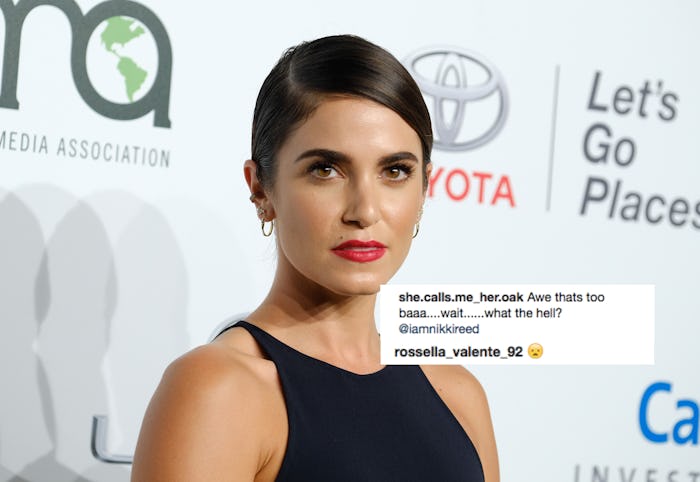Entertainment

People *Freaked Out* Over Nikki Reed's Photo Of Her Placenta Pills
A late contender for the Controversial Celebrity Mom Social Media Post of the Week Award is in, and boy, is this one a doozy. Twilight actress Nikki Reed posted a photo of her placenta pills to Instagram on Thursday, posing with a look of mock horror on her face and captioning the post, "Last day of placenta pills. Not ready to say goodbye!!!!!" Unsurprisingly, the comments have been rolling in, and while quite a few fans expressed only mild curiosity, plenty more took time out of their day to register their disgust. Thank goodness the placenta was in pill form, because trust me, that picture could have been a hell of a lot grosser.
The post has also launched a zealous debate, with participants on both the "pro" and "con" sides of the human placentophagy debate leaving paragraph-long arguments — some level-headed and logical, others a bit more hysterical and defensive. Is an Instagram comment section really the place to discuss the scientific validity of the benefits of eating human placenta, though? Probably not. But at least Reed's fans got the conversation started. If you don't have the time to wade through all their claims and verify each one, let me save you the trouble. Here's what they got right, and wrong, about placenta pills.
"They're Full Of Bacteria"
Some users questioned whether Reed could be sure that the pills were free from bacteria, and worried that they might "contaminate" her breast milk. Presumably those who choose to freeze-dry and encapsulate their placenta take great pains to ensure a clean work area, or do some research into the company that they hire. But the fact is that even healthy placentas are still teeming with bacteria, according to the journal Nature, and it absolutely does cross over into the milk supply if ingested. This is no hypothetical, either; in 2016, it took an Oregon newborn two separate stays in the neonatal intensive care unit for a recurrent antibiotic-resistant bacterial infection before one doctor realized that he was being infected through bacteria in the placenta pills his mother had been taking. "The placenta encapsulation process does not per se eradicate infectious pathogens," the Centers for Disease Control warned in a subsequent report.
"It's Good For Your Skin"
Human placenta does contain a negligible amount of progesterone, a hormone that contributes to skin elasticity. However, women don't need to worry about wrinkles caused by a drop in progesterone until menopause, and while I'm not Reed's doctor (or anyone's, for that matter), I think it's safe to say she's not in menopause right now.
"It Helps Your Uterus Shrink"
Placenta may contain oxytocin, the hormone responsible for uterine contractions, but your uterus doesn't need any help getting back to its pre-baby size. Shrinking automatically begins just minutes after birth, according to BabyCenter, and by four weeks, it's usually back to normal, without any drugs, supplements, or ground up organs.
"All That Estrogen Will Give You A Heart Attack"
Estrogen may increase the risk of heart disease for older women, according to the U.S. National Library of Medicine, but you won't find much, if any, in placenta pills, so luckily, that's one less thing to worry about. Of course, some of those pills contain mystery herbs that cause who knows what, but not estrogen.
"It's A Great Source Of Iron"
While there's no standard formula or dosing for placenta, one double-blind, placebo-controlled study did look into that claim by ordering placenta pills from a placenta encapsulating company, according to Forbes. The pills were found to contain 0.664 milligrams of iron per gram, and participants took the company's recommended dose of two 550-milligram capsules three times a day. That works out to just over 2 grams of iron. The National Institutes of Health recommend that women ages 19 to 50 consume 18 milligrams of iron daily, and lactating women need only 9 milligrams, which can be found in everything from spinach to oysters to candy bars, all of which are objectively more delicious than medical waste.
"Women Have Been Doing This For Centuries"
Eh, only since the 20th. A Northwestern Medicine review of research studies on human placentophagy found that the earliest documentation of the practice was in 1979, and that was one woman on a hippie commune. Your grandmother was most certainly not eating afterbirth.
"Other Mammals Do It, There Must Be A Reason"
Dr. Crystal Clark, Assistant Professor of Psychiatry and Behavioral Sciences at Northwestern University's Feinberg School of Medicine and co-author of the aforementioned study, explained that animals eat their placenta to protect themselves and their young from predators drawn by the smell. There may be some other benefits to animals, such as pain relief or nutrition, but that's only when they eat the whole thing, raw, immediately after giving birth. Also, humans have Percocet and Whole Foods.
The bottom line is that no study has ever shown any benefits to eating human placenta, nor studied the risks, and at least one risk is definitely already known. If you want to learn about why you should or shouldn't eat placenta, read up on what actually scientists have to say, and talk to your doctor. Instagram is the last place you should go for medical advice.
Watch Romper's new video series, Romper's Doula Diaries:
Check out the entire Romper's Doula Diaries series and other videos on Facebook and the Bustle app across Apple TV, Roku, and Amazon Fire TV.